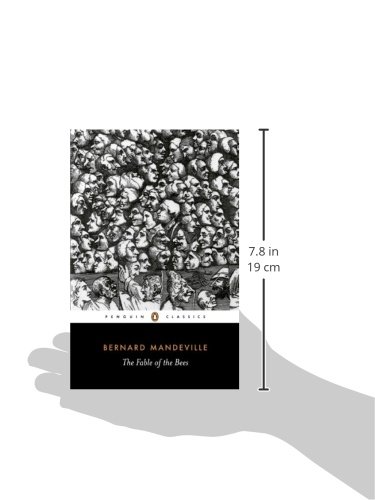



Bernard MandevilleThe Fable of the Bees: Or Private Vices, Publick Benefits (Penguin Classics)
J**S
Interesting Work - Good Introduction
I could not recall this book from my college days. I included it as part of a retirement reading program that I pursue as a hobby in history of government and political theory. Mandeville, like most authors of this era, takes some effort to understand. I very much enjoyed the book and would compare him favorably with Hume or even Machiavelli. I have found that most of the books in the Penguin Classics are very well done and economical. The Oxford series of classics are much more heavily footnoted and sourced for the more serious student.
S**1
Difficult But Worth It
Mandeville's main point, that people dont do moral things for pure motives and that immoral actions often create wealth and prosperity while Puritanical fanaticism is the enemy of wealth and freedom, was considered shocking in its time and up to the present day. Now that 'Societal Correctness' will be enforced by Bots who lack the ability to perceive irony or sarcasm, this book may not be available for long, although in the current state of iphone illiteracy it might be so incomprehensible to The Woke that this naughty little antique might miss the bonfire.
A**X
This is Only Volume 1, It does not contain Volume 2.
Thesis of the book: People's private vices are used by society in a way that creates public benefits. If a society was virtuous it would have to give up the public benefits created by vice.I would recommend this book to anyone who finds its central ideas interesting. It is well written, original, and tells its story in a very creative way. The book is also public domain, this means that the Penguin edition gains it's value from its additions.Pro of the penguin edition:Pro:-The introduction written by Phillip Harth does a good job at letting people know Bernard's central ideas, his life history, and the impact the work had.-The footnotes are well placed and give good context to many points that modern readers may not be aware of. This version also marks all the revisions made by the original author, allowing the reader to see which parts were added by the author as time went by.Con:-This is only volume 1. Volume 2 which is crucial to understand the economic impact of Bernard's theory is not present. This may be because Volume 1 is more famous due to its stance on morality, while Volume 2 is written like six Platonic Dialogue and focuses more on trade.Verdict: If I knew the penguin edition did not contain volume 2 I would not have bought it. That being said, the additions to volume 1 are welcomed.
H**R
A man ahead of his time.
Few realize just how competent Mandeville was when it came to analyzing human motivations.
N**A
Three Stars
The cover was cut off in half
I**E
Unmasking Social Convention
Mandeville does a sterling job in unmasking social convention. His fable, upon which he provides his own commentary, stripes the outer layers of social convention from the reader and examines man from the perspective of his basic selfishness.Mandeville has been criticized by many, whom he recognized, that have not even read his works. His work is still now largely neglected and unread., partly due to the quaintness of his 18th century writing style. But what a treasure awaits those who have the patience and perseverance to read this delightful work of ruthless honesty.For example, Mandeville describes marriage mainly in terms of lust, not much different from the modern evolutionary psychologists. Prostitution is defended in pragmatic terms in that it 'protects' the family! Rulers who devote more time to the outward trapping of power and neglect such things as an adequate defense or police system come in for a serving. And on and on it goes ...Mandeville is important in that the likes of Hume and Adam Smith were not only aware of his work, but influenced, in a positive way, by it. Mandeville, in terms of the development of our understanding of morals and society, cannot be neglected.If you want to look society... and ourselves... honestly in the face, then this is the book.My advice is buy the Libery Fund 2 volume edition
G**M
Interesting
I first read an extract from this in second year English in university, and thought the author had some interesting ideas. Although the blurb casts the book as part of the great age of 17th-century English satire, it's more of a straight critique of society than a sarcastic diatribe, and probably doesn't warrant comparison with say, Swift's A Modest Proposal.From what I can remember, the book is all about the changes taking place in society at the time, especially with the growth in the importance of commerce. Much of it concerns hypocrisy and some moral paradoxes that seem to go unnoticed. Mandeville's starting-point is to liken society to a hive, wherein the behaviour of the bees, though individually selfish, aggregates to form a kind of common good. The book was banned by the Grand Jury of Middlessex, and I suspect that much of the controversy resulted from readers mistaking description for prescription. In other words, people seem to have concluded that Mandeville was saying that this is how society ought to behave, whereas he was merely making observations.His ideas are interesting, but I can't agree with all of them. One egregious error occurs when he makes the sweeping generalisation that morality is frequently selfishly motivated, using the following argument. Most people, if they see a baby falling from a high window, will rush to try and save it, not out of the child's interests, but merely to spare themselves the pain of seeing the child injured or killed. The next obvious question never seems to enter Mandeville's mind: if people are truly selfish, how would they have developed the empathy to feel the child's pain that strongly to begin with? So: a good commentator but perhaps not a brilliant thinker.
D**A
Vices and Benefits: Two Sides of a Single Coin?
Mandeville's book caused quite a stir back in the old days. The premise that vices stimulate the economy and the latter would collapse without the former did not go down comfortably with the religious and morally upstanding middle class in olde England. But I would aver that "private vices, public benefits" is as true then as it is now. This edition is in three parts: First comes the famous poem The Grumbling Hive in whichThus Vice nursed IngenuityWhich join'd with Time, and IndustryHad carry'd Life's Conveniences,It's real Pleasures, Comforts, Ease,To such a Height, the very PoorLived better than the Rich before;And nothing could be added moreThe short end of the story is that in this hive, vice reigned supreme and the morally indignant called for an end to it except when vice did end so did prodigality and so did the production that went with the consumption and so did the jobs that went with the production etc etc and thus came the collapse of the economy. Quite mathematical if you ask me.The second part of the book picks out lines in the poem that are then expounded on in length in Remarks that go from A to Y. Mandeville's defense of his central premise is as forceful as it is enlightening. It's funny how quickly one starts to nod the head in agreement. Finally there are the essays on the well-meaning charity schools of the English middle class and on the nature of society where:"Every body is for turning the Penny and short Bargains...Instead of planting Oaks, that will require a Hundred and Fifty Years before they are fit to be cut down, they Build Houses with a design that they shall not stand above Twelve or Fourteen Years. The Mathematicks become the only valuable Study and are made use of in every thing even where it is ridiculous." OK that sounds like the 21st century, no?I expect many with a moral persuasion will take offence at Mandeville but as he says: "In all Civil Societies Men are taught insensibly to be Hypocrites from their Cradle". I agree completely.
M**N
Good book - worth a punt
Good value, but book had written notes in it. Seller gave a discount so fair enough.
J**W
Rafraîchissant
Merveilleuse fable, écrite dans un anglais du XVIIIe siècle savoureux. Une société (d'abeilles, bien sûr) corrompue jusqu'à la moelle peut fonctionner vaille que vaille. Mais si la moralisation survient, tout s'écroule et la ruche se vide.L'addition d'autres écrits de Mandeville n'est guère utile.
J**Y
Five Stars
Great
B**A
Five Stars
You'd never know otherwise
Trustpilot
1 month ago
2 weeks ago